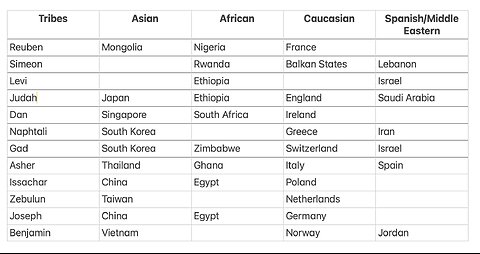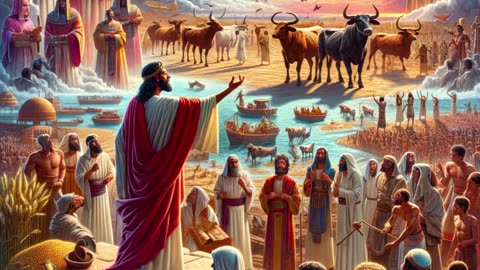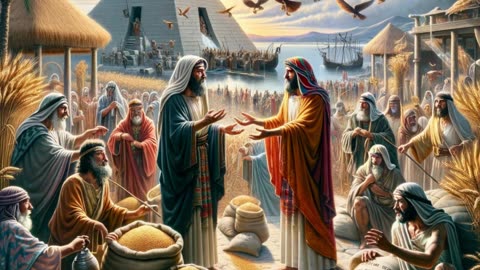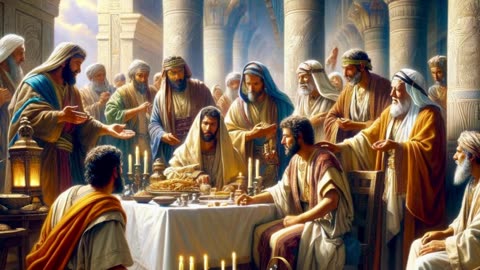
-
1
Genesis 50: The Legacy of Reconciliation and Promise
ssovereigndaudWelcome to our journey through Genesis, the first book of the Bible, where the themes of creation, covenant, and redemption unfold. From the creation of the world by Yahuah to the complex saga of Joseph, Genesis explores the beginnings of humanity and the divine promises made to the patriarchs. We witness Yahuah's covenant first with Noah and then more fully with Abraham, promising blessings that echo through generations. Through Abraham, Isaac, Jacob, and Joseph, we see the challenges and triumphs of faith, the consequences of human actions, and the steadfastness of Yahuah's commitment. As we conclude with Joseph's legacy in Egypt, Genesis sets the stage for Yahuah's ongoing plan for His people. A good fundamental understanding of Genesis is essential as it lays the groundwork for the entire Biblical narrative, providing key insights that illuminate the rest of Scripture. Reflect on these stories, considering their implications for faith, family, and forgiveness in our lives today. Join us in uncovering how these ancient narratives continue to resonate and inspire, and how they establish a foundation that will enhance your comprehension of the entire Bible.37 views -
2
GENESIS 49 I asked AI if the 12 tribes were white, where would they be today? (pure speculation)
ssovereigndaudReuben - Perhaps symbolized by France, a nation that was once dominant in Europe but experienced significant internal turmoil and external challenges that diminished its preeminence over time, reflecting Reuben's loss of status due to his instability. Simeon and Levi - Represented by the Balkan states, known for their turbulent history of internal strife and ethnic conflicts, mirroring the violent and divisive nature of Simeon and Levi. Judah - Could be likened to England, a nation with a historical role in leadership, governance (symbolized by the scepter), and a significant religious and cultural influence globally, akin to Judah’s leadership and the prophetic role of being a precursor to royal and messianic lineage. Zebulun - The Netherlands, a nation historically significant for its maritime trade and strategic ports, aligns well with Zebulun’s dwelling by the seashore and its prosperity through shipping and trade. Issachar - Possibly represented by Poland, a nation known for its agricultural strength and history of enduring hard labor under foreign domination, reflecting Issachar's strong but burdened character. Dan - Could be symbolized by Ireland, known for its strategic positioning, historical struggles for identity and sovereignty, and the emblematic figure of the snake in its mythology (St. Patrick and the snakes), reflecting Dan’s character as a judge and a serpent by the path. Gad - Represented by Switzerland, historically known for its military prowess as a nation of warriors and its strategic geographical position, echoing Gad’s defensive and raiding skills. Asher - Italy, renowned for its rich cuisine and agricultural produce, aligns with Asher’s blessing of providing royal delicacies. Naphtali - Represented by Greece, celebrated for its culture, arts, and the eloquence of its ancient philosophers and poets, mirroring Naphtali’s described beauty and eloquence. Joseph - Could be likened to Germany, a nation known for its economic strength and industrial prowess, akin to Joseph’s fruitful branches over the wall, symbolizing growth and abundance. Benjamin - Norway, known for its fierce independence and historical Viking warriors, could represent Benjamin as a ravenous wolf, dividing the spoils with strength. Thank you for joining me on this exploratory journey through Genesis 49 and our speculative mapping of the tribes of Israel to modern nations and cultures. As we've seen, each tribe's blessing holds potential clues that might resonate with the characteristics of various global communities. This exercise is not about drawing firm conclusions but rather about expanding our perspectives and appreciating the depth of biblical texts in a contemporary context. I encourage you to reflect on this discussion and consider your own views. Do you see other potential connections? How does exploring these possibilities affect your understanding of the biblical narrative and its relevance today? Feel free to share your thoughts and insights, as this conversation can only enrich our collective exploration. Remember, the beauty of studying ancient scriptures lies in the multitude of layers and meanings they offer, inviting us to seek, knock, and ask continually, as we strive to piece together the vast puzzle of human history and divine interaction. Let's keep the conversation going and continue to explore these fascinating themes together. Until next time, keep pondering, keep questioning, and stay curious about the world of the Bible and beyond.138 views -
3
"Divine Favor and Transformation in Genesis: The Blessing of the Younger Son"
ssovereigndaudDive into the profound narrative of Genesis 48, where Jacob blesses his grandsons, Ephraim and Manasseh, placing the younger before the elder—a decision that may reflect divine influence from Yahuah. This video explores whether Jacob's choice was his own or inspired by divine observation, similar to Yahuah's watchful eye over figures like Cain, Abel, and the patriarchs themselves. We also discuss the significance of Yahusha, from the tribe of Ephraim, noted for his fearlessness in the conquest of Canaan and the fall of Jericho's walls, encapsulated in his call to action: "Choose you this day." As you listen and reflect on these scriptures, envision the transformative power of the Word—how it nurtures every cell, expands the heart, enriches wisdom, and feeds the soul. Join us for an enlightening exploration into how these ancient blessings and choices echo through spiritual growth and destiny.24 views -
4
Genesis 45 Divine Recognition and Forgiveness:
ssovereigndaudFood for Thought Description In the poignant narrative of Genesis 45, Yosef reveals himself to his brothers who had sold him into slavery, a moment of profound recognition and forgiveness. This scene echoes in the New Testament when Yahusha, not initially recognized as the Messiah, was finally understood by His disciples in the breaking of bread after His resurrection (Luke 24:30-31). Similarly, Yosef's forgiveness of his brothers prefigures Yahusha’s teachings on the necessity of limitless forgiveness, as He instructs Kepha (Peter) to forgive "seventy times seven times" (Matthew 18:21-22), emphasizing the boundless nature of divine forgiveness. Preservation and Providence Through Trials: The biblical theme of preserving a remnant through adversity is vividly portrayed in the stories of Noach and the great flood and the later exiles of Israel and Yahudah. Despite judgment, a remnant is always preserved, which Yeshayahu (Isaiah) 10:20-22 highlights as a return to the mighty Alahim. This theme is also encapsulated in Yosef’s life, where seven years of plenty followed by seven years of famine demonstrate Yahuah’s providential care. Yosef’s divinely inspired strategy not only anticipates the hardships but also ensures Mitsrayim's (Egypt's) survival, symbolizing both preparation and providence. The Symbolic Completeness of the Number 7: Central to Yosef's story and Biblical creation, the number 7 symbolizes completeness and divine orchestration. In Bereshith (Genesis) 1, Yahuah's creation of the world in six days, culminating in a seventh day of rest, establishes a pattern of completion and sanctity that resonates through scriptural narratives. The seven-year cycle in Yosef’s era underlines that survival and reunion sometimes require enduring a complete cycle of hardship, as seen when Ya'akov (Jacob) moves to Mitsrayim to be with Yosef, ensuring his family's survival through the remaining five years of famine. Insightful Reflection: The decision of Ya'akov to move his family to Mitsrayim, driven by the continuation of the famine, underscores the theme that Yahuah’s plans often require enduring through a complete cycle of challenges for fulfillment. Had the famine been shorter, Ya'akov might have remained in Kena'an (Canaan), altering the course of biblical history and the essential lessons we draw from these narratives.39 views 1 comment -
5
Exploring the Heart of Yahuah: Joseph and David's Faithful Journeys
ssovereigndaudJoin us as we delve into Genesis 44, exploring the pivotal moment where Joseph tests his brothers. This chapter not only highlights Joseph’s strategic mind but also sets the stage for profound lessons in faithfulness, integrity, and divine providence. Let's draw parallels between Joseph, the visionary governor of Egypt, and David (Daud), the beloved king of Israel. Both figures exemplify qualities that reflect the heart that seeks Yahuah through their actions and decisions. Faithfulness in Adversity: * Joseph: Genesis 39:21-23 — "But Yahuah was with Joseph and showed him mercy, and gave him favor in the sight of the keeper of the prison." * David: 1 Samuel 23:14 — "And David stayed in strongholds in the wilderness, and remained in a mountain in the wilderness of Ziph. Alahim did not deliver him into the hand of Saul." Integrity: * Joseph: Genesis 39:8-9 — "But he refused and said to his master’s wife, ‘Look, my master does not know what is with me in the house, and he has committed all that he has to my hand... how then can I do this great wickedness, and sin against Alahim?’" * David: 1 Samuel 24:6 — "And he said to his men, ‘Yahuah forbid that I should do this thing to my master, Yahuah’s anointed, to stretch out my hand against him, seeing he is the anointed of Yahuah.’" Leadership and Wisdom: * Joseph: Genesis 41:38-39 — "And Pharaoh said to his servants, ‘Can we find such a one as this, a man in whom is the Spirit of Alahim?’ Then Pharaoh said to Joseph, ‘Inasmuch as Alahim has shown you all this, there is no one as discerning and wise as you.’" * David: 2 Samuel 5:10 — "And David went on and grew great, and Yahuah Alahim of hosts was with him." Forgiveness and Compassion: * Joseph: Genesis 50:21 — "Now therefore, do not be afraid; I will provide for you and your little ones.’ And he comforted them and spoke kindly to them." * David: 2 Samuel 9:1,7 — "Then David said, ‘Is there still anyone who is left of the house of Saul, that I may show him kindness for Jonathan’s sake?’... So David said to him, ‘Do not fear, for I will surely show you kindness for Jonathan your father’s sake, and will restore to you all the land of Saul your grandfather; and you shall eat bread at my table continually.'" Providence and Trust in Yahuah: * Joseph: Genesis 45:5-8 — "But now, do not therefore be grieved or angry with yourselves because you sold me here; for Alahim sent me before you to preserve life... So now it was not you who sent me here, but Alahim." * David: Psalm 18:2 — "Yahuah is my rock and my fortress and my deliverer; My Alahim, my strength, in whom I will trust; My shield and the horn of my salvation, my stronghold." Resilience: * Joseph: Genesis 41:52 — "The name of the second he called Ephraim: ‘For Alahim has caused me to be fruitful in the land of my affliction.’" * David: Psalm 59:16 — "But I will sing of Your power; Yes, I will sing aloud of Your mercy in the morning; For You have been my defense And refuge in the day of my trouble." Recognition of Yahuah’s Sovereignty: * Joseph: Genesis 45:8 — "So then, it was not you who sent me here, but Alahim; He made me father to Pharaoh, lord of all his house, and ruler throughout all the land of Egypt." * David: Psalm 31:14-15 — "But as for me, I trust in You, O Yahuah; I say, ‘You are my Alahim.’ My times are in Your hand; Deliver me from the hand of my enemies, and from those who persecute me." P.S.: Interestingly, the name 'Joseph' not only connects us to the remarkable governor of Egypt but also to another significant figure: Joseph of Nazareth, the stepfather of Yahusha. Both men, separated by centuries and contexts, share a name that stands for righteousness and faithful stewardship in the face of divine missions. This connection highlights the timeless nature of Yahuah’s guidance and the role of named individuals in fulfilling His purposes across the scriptures.71 views 4 comments -
6
Genesis 41: "Dreams of Destiny: Divine Messages and Practical Wisdom"
ssovereigndaudDive into Genesis 41 where dreams aren't just a night-time curiosity but pivotal revelations that shape the destiny of nations. This chapter narrates Joseph's rise from a forgotten prisoner to a revered leader through the power of dream interpretation, marking a turning point not only in his life but also in the history of Egypt. Key Themes Explored: 1. Prophetic Dreams and Divine Communications: Explore how Pharaoh’s troubling dreams about seven years of plenty followed by seven years of famine were not mere figments of sleep but divine messages needing wise interpretation. Understand how these dreams, interpreted by Joseph, set the stage for crucial strategies that would save countless lives. 2. Joseph's Journey from Dreamer to Leader: Reflect on Joseph's journey, which begins with his own dreams predicting his rise to power. These dreams, initially causing strife with his brothers, eventually align with his destiny when he interprets Pharaoh’s dreams. Witness how Joseph's faith and moral integrity guide him through his darkest hours to his role as Egypt's savior. 3. Practical Application of Dream Insights: Delve into how Joseph’s interpretations lead to practical actions — the establishment of agricultural policies and storage systems that prepare Egypt for impending famine. This story teaches invaluable lessons on foresight, preparation, and governance. 4. The Power of Resilience and Divine Guidance: Gain insights into how, under divine guidance, Joseph transforms personal misfortune into national triumph. This segment explores how faith, coupled with action, moves mountains and alters histories. 5. Modern Implications of Ancient Wisdom: Draw parallels between Joseph’s experiences and today’s challenges. Whether it’s overcoming personal setbacks or managing large-scale projects, the principles of resilience, strategic planning, and ethical leadership remain relevant. Conclusion: Genesis 41 isn’t just a historical recount; it's a masterclass in leadership and faith in action. Join us as we uncover how dreams can be more than just visions of the night — they can be directives from the divine that invite us to engage deeply with our realities, inspiring both spiritual growth and practical solutions. This video aims to resonate with viewers who seek deeper understanding and appreciation of biblical narratives, showing how ancient stories can provide timeless wisdom for personal growth and leadership.34 views -
7
Testing and Redemption: Lessons from Genesis 42
ssovereigndaudConsidering Genesis 42 the powerful themes of testing and redemption woven throughout this chapter. Join us on a journey of discovery as we examine how Joseph's testing of his brothers ultimately leads to their redemption and restoration as a family. Through this biblical narrative, we'll uncover timeless truths about the refining power of trials and the ultimate redemption found in Yahuah and Yahusha. Scriptures Referenced: * James 1:2-4: "Consider it pure joy, my brothers and sisters, whenever you face trials of many kinds, because you know that the testing of your faith produces perseverance. Let perseverance finish its work so that you may be mature and complete, not lacking anything." * 1 Peter 1:6-7: "In all this you greatly rejoice, though now for a little while you may have had to suffer grief in all kinds of trials. These have come so that the proven genuineness of your faith—of greater worth than gold, which perishes even though refined by fire—may result in praise, glory and honor when Yahusha the Messiah is revealed."20 views 2 comments -
8
Divine Promises Fulfilled: Genesis 43
ssovereigndaudIn Genesis 43, we witness the unfolding of divine promises as the journey of faith set in motion by Yahuah continues. From Abraham's covenant to Isaac's miraculous birth and Jacob's journey to Egypt, each step in this saga echoes the faithfulness of Yahuah and the fulfillment of His promises. Join us as we delve into the depths of Genesis 43, exploring how the threads of divine providence weave through the tapestry of generations, leading us to Yahusha, the ultimate fulfillment of Yahuah's covenant. Scriptural parallels: 1. Abraham's Covenant with Yahuah: * Genesis 15:13-14 - "Then Yahuah said to Abram, 'Know for certain that for four hundred years your descendants will be strangers in a country not their own and that they will be enslaved and mistreated there. But I will punish the nation they serve as slaves, and afterward they will come out with great possessions.'" * Galatians 3:6-9 - "So also Abraham ‘believed Yahuah, and it was credited to him as righteousness.’ Understand, then, that those who have faith are children of Abraham. Scripture foresaw that Yahuah would justify the Gentiles by faith, and announced the gospel in advance to Abraham: 'All nations will be blessed through you.' So those who rely on faith are blessed along with Abraham, the man of faith." * 2. Isaac's Birth and the Continuation of the Covenant: * Genesis 21:1-3 - "Now Yahuah was gracious to Sarah as he had said, and Yahuah did for Sarah what he had promised. Sarah became pregnant and bore a son to Abraham in his old age, at the very time Yahuah had promised him. Abraham gave the name Isaac to the son Sarah bore him." * Luke 1:13, 18-20 - "But the angel said to him: 'Do not be afraid, Zechariah; your prayer has been heard. Your wife Elizabeth will bear you a son, and you are to call him John.' Zechariah asked the angel, 'How can I be sure of this? I am an old man and my wife is well along in years.' The angel said to him, 'I am Gabriel. I stand in the presence of Yahuah, and I have been sent to speak to you and to tell you this good news.'" 3. Jacob's Journey to Egypt: * Genesis 46:1-4 - "So Israel set out with all that was his, and when he reached Beersheba, he offered sacrifices to the Yahuah, the Alahim of his father Isaac. And Yahuah spoke to Israel in a vision at night and said, 'Jacob! Jacob!' 'Here I am,' he replied. 'I am Yahuah, the Alahim of your father,' he said. 'Do not be afraid to go down to Egypt, for I will make you into a great nation there. I will go down to Egypt with you, and I will surely bring you back again.'" Join us as we uncover the timeless truths and spiritual significance of Genesis 43, drawing parallels to our own journey of faith in Yahusha today. 📖✨ #YahuahsPromises #YahushasFulfillment #Genesis4340 views 2 comments






